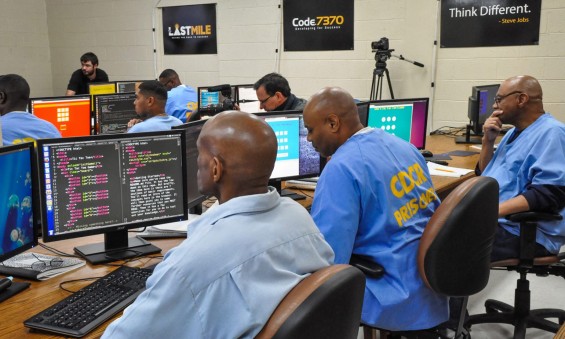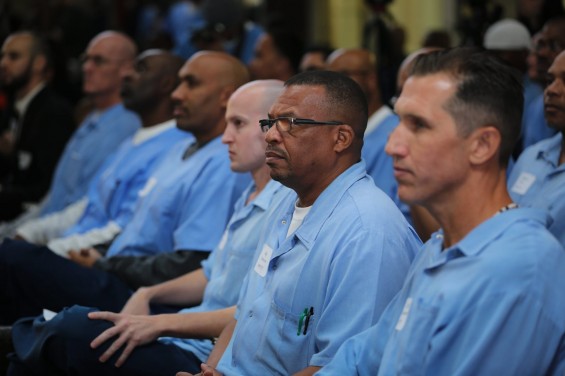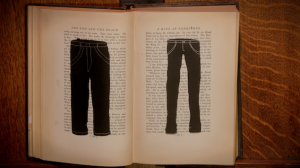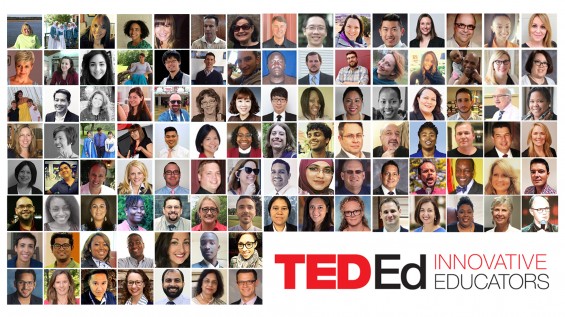
Why I’m teaching prisoners to code
 Inmates at the San Quentin computer lab. Photo: Andrew Landini.
Inmates at the San Quentin computer lab. Photo: Andrew Landini.
Chris Redlitz of The Last Mile describes the thinking behind Code.7370 San Quentin, a program to rehabilitate prisoners by teaching them to code.
Six years ago, I entered San Quentin State Prison for the first time. I had never been in a prison before, especially one with as ominous a reputation as San Quentin.
When I arrived, I was escorted through a series of gates that eventually led to the main courtyard. On my left was the adjustment center that houses death-row inmates, some of the notorious criminals in California.
On my right was the Catholic Chapel, surrounded by a well-manicured garden. I was, as they say at San Quentin, at the gate between heaven and hell.
As the sun was setting, I was led down a paved road, past the guard towers into the lower yard where hundreds of men in blue were exercising, playing chess or just milling around.
Frankly, at that point, I was questioning my decision to come there.
“These men were committed to learning how they could create a better life after they served their time.”
I was taken to a small classroom where I was scheduled to speak to a group of men about business and entrepreneurship.
When I began my talk, I noticed that the men were fixated on every word. There weren’t any distractions. There are no cell phones in prison.
When I was finished speaking, hands went into the air. My thirty-minute talk turned into a two-hour discussion. These men were prepared, motivated and committed to learning how they could create a better life after they served their time.
This was not the profile of social misfits that I had expected to encounter.
 From left to right, inmates Chris Schuhmacher, Aly Tamboura and Steve Lacerda at Code.7370 San Quentin. Photo: Andrew Landini.
From left to right, inmates Chris Schuhmacher, Aly Tamboura and Steve Lacerda at Code.7370 San Quentin. Photo: Andrew Landini.
I was excited after I left the prison that night. Through my years of work at an early-stage venture fund, I’ve worked with aspiring entrepreneurs in Silicon Valley for a long time. Could I do the same with those in prison?
I was excited to tell my wife, Beverly, and develop a plan.
Her first reaction was, “I am not spending my time in prison.”
I asked her to have an open mind before making any judgment. I asked her to help me do some research into incarceration in America and to visit San Quentin to meet the men I’d met that day.
What we learned about issues facing the prison system today was shocking:
- From 1972 to 2010, the number of people in prison in the US had increased 700 percent.
- 25% of the world’s incarcerated population is in the US.
- In California, we spend more on prisons than on higher education.
- It costs around $47,000 to keep one prisoner in jail in California for one year.
- More than 67% of the state prisoners released in 2005 were arrested within the next three years.
You don’t have to be a professional investor to realize that this is a bad investment for taxpayers.
If we could reduce recidivism by just 5 percent, we could save billions of dollars over the next ten years. But without rehabilitation these problems will persist.
In 2010, partnering with the California Department of Corrections and Rehabilitation and the California Prison Industry Authority (CalPIA), we created a six-month business and entrepreneurship program called The Last Mile to leverage many of the disciplines that we use within our investment practice. We work with prisoners who’ve committed many crimes, some of them violent. (We don’t work with those on death row or with people incarcerated for crimes against children.)
“None of our graduates have gone back to jail.”
We asked the men to create a business around a personal passion, and we taught them how to build a business plan. In one of the early graduating classes, James Houston developed a nonprofit business plan that would positively impact at-risk youth in his old neighborhood. James created Teen Tech Hub, an afterschool program, teaching app development and basic coding instruction for kids 10 to 14 years old. After serving 18 years in prison, James returned to Richmond, California, to pursue his dream. He was hired by the City of Richmond and he plans to launch Teen Tech Hub in the fall of 2016.
In 2014, we launched Code.7370 San Quentin, the first computer programming curriculum in a US prison. The results have been extraordinary. Some of our graduates will be released this year and we are confident they will be hired as software engineers. With hard work and determination, these men have overcome serious obstacles and created a positive path for their future.
The Code.7370 curriculum will be introduced to five more prisons in California this year, including two women’s prisons. We hope to create a national program within the next five years.
Beverly and I have become Lifers. The Last Mile is a lifelong commitment for us, and we are blessed that so many incredible people have dedicated their time to make this program such a powerful experience. We are proud of our returned citizen graduates, none of whom have gone back to jail. They pave the way for others to follow.
ABOUT THE AUTHOR
Chris Redlitz is one of the founders of The Last Mile program. This piece was adapted for TED-Ed from this Ideas article.



